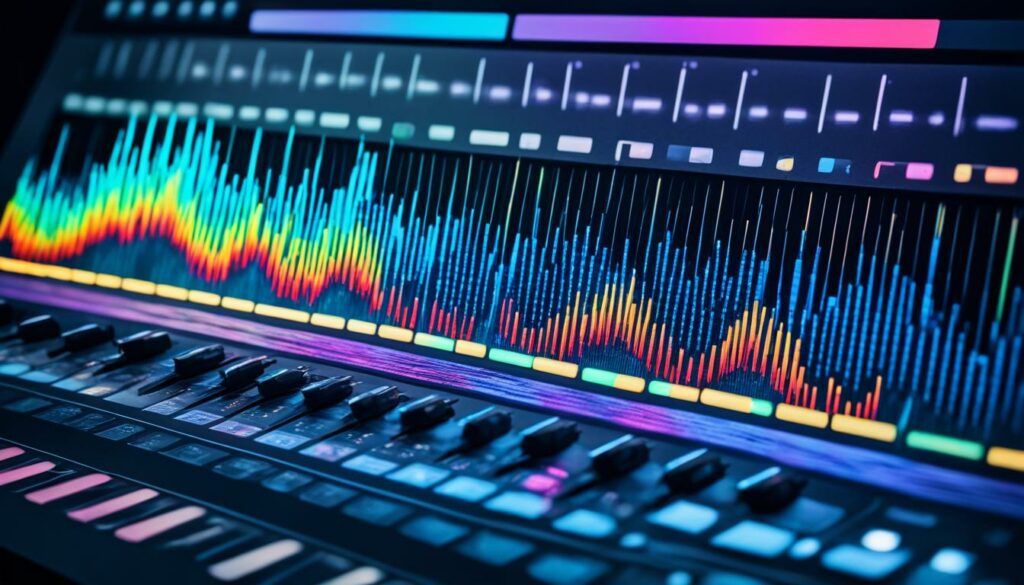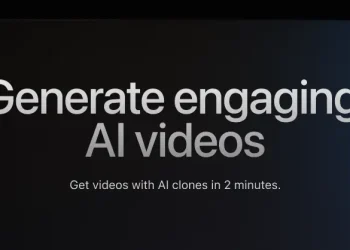Did you know the podcast market could hit $4.2 billion by 2025? This shows how fast audio content is growing and how AI is changing the game. Now, creators use AI to make top-notch audio fast and easy. Tools like voice tech and automated editing make sound design better without a lot of work.
AI lets creators try out new ways to make audio. This means better podcasts, audiobooks, and music without spending a lot on gear. As new tech comes out, making audio is getting easier for more people. This could change how we hear and enjoy sound.
Key Takeaways
- The market for podcasts is set to surpass $4.2 billion by 2025, indicating significant growth.
- AI technology enhances productivity in audio content creation, facilitating faster production times.
- AI-driven tools are transforming the landscape of audio editing and synthesis.
- Voice cloning and text-to-speech synthesis are becoming mainstream in audio production.
- AI can personalize audio content recommendations, improving user engagement.
The Rise of AI in Audio Technology
AI is changing how we make and listen to audio. It’s now worth about $4 billion and could be worth triple that by the end of the decade. This shows it’s growing fast. Machine learning is making audio tools better for everyone.
Now, 62% of American adults use voice assistants like Siri and Alexa. This has led to new innovations. These tools improve audio by reducing noise and making voices clearer. Adobe and iZotope are at the forefront, offering affordable AI solutions for creators.
AI isn’t just for making audio better. It’s also used in entertainment and customer service. With generative AI, creators can make a lot of content fast. Pocket FM uses AI to make thousands of hours of audio series at a much lower cost.
The entertainment world is changing fast, thanks to AI. It’s making music and podcasts easier to create. But, there are worries about AI’s accuracy and cultural mistakes. There’s also fear of losing jobs in the voiceover industry and lower quality content.
As audio technology grows, we face big challenges. We need to work on quality, ethics, and how to use AI right. These issues will guide the future of AI in audio, ensuring it grows well and innovates.
Understanding AI Audio Content Creation
AI audio content creation is changing how we make and enjoy sound. It uses artificial intelligence to make audio that sounds real and touches our feelings. This includes things like voice generation, which is making text-to-speech better.
Companies like ElevenLabs are leading the way with their audio AI skills. They’re making audio sound better and creating stories that you can interact with. This is making people more involved in what they listen to.
More than 80% of companies plan to use AI tools by 2026. This shows a big move towards using technology to make content faster. AI helps make content creation quicker and more creative.
A Microsoft survey found that 90% of users save time with AI, and 84% think it helps them be more creative. These tools are useful for making everything from social media posts to blog outlines. Knowing about these tools is key for anyone in AI audio content creation.
The Power of Text-to-Speech Synthesis
Text-to-speech synthesis has changed a lot, moving from simple robotic sounds to advanced, human-like voices thanks to AI. This change has made text-to-speech synthesis key for making audio accessible. It helps content creators reach more people.
The Speech Studio uses TTS technology to let users create high-quality voices without coding skills. People can make audio that fits their content by adjusting voice styles and how fast it speaks.
Companies like Google DeepMind and Azure are leading this change with their WaveNet and audio tools. These tools offer many features, including:
- Creating custom neural voices.
- Free monthly speech quotas, offering 0.5 million characters for prebuilt voices.
- Support for various audio formats like WAV and MP3.
- Collaborative access through Azure subscriptions.
Thanks to neural networks, text-to-speech synthesis is changing how we interact in healthcare, education, and entertainment. It makes content more engaging and accessible for everyone.
The future of TTS is about making voices more flexible and natural. It will respond to what users like and need. AI voice generation with features like sentiment analysis will change how we talk to computers.
Voice Cloning and Its Applications
Voice cloning technology is a big leap forward, letting us copy human voices with advanced algorithms. It has many uses, especially in making audio more personal across different fields. For example, Spotify uses AI voices to help people from all over the world listen to podcasts.
This tech also makes making podcasts easier for everyone. Creators can share their stories with more people, celebrating different cultures. AI helps by suggesting podcasts that match what listeners like. But, there are also big questions about who agrees to be cloned and how true to life these voices are.
Even with its perks, making voices sound real and feeling right is still a challenge for Spotify. Big names like Apple Podcasts and Google Podcasts are also looking into AI for their shows. Using voice cloning could change how we make and enjoy podcasts, bringing us closer to the stories with AI and text-to-speech tech.
| Industry | Applications of Voice Cloning | Ethical Considerations |
|---|---|---|
| Film | Dubbing in multiple languages | Consent for voice replication |
| Gaming | Creating immersive experiences | Authenticity of character voices |
| E-learning | Personalized lesson delivery | Respect for student identity |
| Speech Therapy | Custom voices for speech-disabled individuals | Privacy in voice modeling |
As we keep improving natural language processing, we’re on the brink of even more personalized podcasting. Voice cloning could change how we tell stories in podcasts, making them more personal and engaging. As we move forward, it’s key to use this tech wisely to get the most out of it.
AI in Audio Content Creation: Transforming the Landscape
AI is changing how creators make audio content. It helps with tasks like transcribing speech, editing, and adding ads. Tools like Descript use AI to make these tasks easier, making creators more efficient.
AI can make audio sound better by reducing noise and fixing levels. This lets creators focus on telling stories instead of dealing with technical stuff. It’s helping move podcasts forward.
AI also changes how podcasts make money. It helps brands target ads to the right listeners. This makes ads more effective and can increase earnings. AI also puts ads in podcasts automatically, keeping the show smooth and making more money.
AI gives creators insights on how their podcasts are doing. This helps them make better choices about their content. It also helps them reach more people by spreading their podcasts on different platforms. Experts predict the AI market for making content will grow a lot, reaching USD 11.6 billion by 2023 and USD 175.3 billion by 2033.
Speech Recognition: Enhancing User Experience
Speech recognition technology is key to making audio platforms better. It lets users talk to content easily through voice interaction. Apple’s Siri and Amazon’s Alexa show how speech recognition makes things easier for users.
AI and machine learning have changed how we listen to media. They make recommendations based on what we like and what we’ve listened to before. This makes listening to audio more enjoyable. AI also picks up on emotions in audio, so it can suggest content that matches how we feel.
AI helps make playlists by sorting audio by genre, mood, and language. It makes finding audio easier by turning speech into text. This means we can quickly find specific parts of podcasts, audiobooks, or radio shows.

Feedback analysis helps streaming platforms find popular hosts and topics. This info helps them decide what content to add. AI also makes it easier to understand podcasts or audiobooks by highlighting important points.
AI also helps make money from audio streaming by looking at who listens and what they like. Tools that edit audio automatically make listening better by removing noise and enhancing sound quality. The future might bring even more immersive experiences with virtual and augmented reality.
But, speech recognition still faces challenges. It’s hard to understand different accents, speech in loud places, and get it right all the time. Yet, it’s getting better and will likely change how we use technology in healthcare, telecom, and media.
Innovations in Podcast Creation
The world of podcast creation is changing fast, thanks to AI technology. These new tools make making podcasts easier and better. They help with the quality and speed of production.
AI-generated podcasts are becoming popular. They let creators focus on the story while the AI handles the hard parts. AI tools make making content easier, letting podcasters make shows quicker and with higher quality. For example, AI can give accurate transcripts in minutes, helping with language barriers and making shows more accessible.
AI helps with editing podcasts too. It can remove background noise, making the sound clearer and levels even. Platforms like Descript, Anchor, and Auphonic use AI to make making and editing podcasts easier. This helps creators make a professional final product that more people will like.
AI also helps make listening to podcasts better. It can suggest new shows based on what you like. This makes finding new shows easier and helps brands reach more listeners.
“AI-generated podcasts bring about ethical and legal considerations that are crucial in today’s digital landscape.”
But, there are challenges like data privacy and mistakes that AI can make. Keeping user info safe is key since AI uses data to make things more personal. Creators need to be careful with AI to avoid problems.
In short, AI is changing how podcasts are made and how we listen to them. These changes are making podcasts more engaging and important for brands to share their stories.
| Feature | Benefits | Examples |
|---|---|---|
| AI Transcription | Saves time, increases accessibility | Speechmatics |
| Audio Editing Tools | Enhances quality, reduces production time | Descript, Auphonic |
| Content Personalization | Targets relevant audiences | Podbean |
| Voice Cloning | Seamless updates, unique content generation | Resemble AI |
| Analytics | Improves content strategy | Various hosting platforms |
The Role of AI in Music Generation
AI has changed the music industry by making it easier to create music. It uses complex algorithms to look at lots of music and make new tunes. This leads to music that is fresh and inspired by many styles.
AI does more than just make music. It can also look at lyrics and come up with new verses that fit the song’s mood. This helps songwriters who need new ideas. Plus, AI can suggest chord changes and give feedback while making music.
AI helps musicians by automating tasks like fixing audio levels. This lets artists spend more time on being creative. AI also recommends music based on what listeners like, making it more fun for everyone.
AI is great for sound design too. It can make new sounds that mimic real instruments. It’s also important for protecting music rights by catching unauthorized use and helping with licensing.
Tools like Project Music GenAI Control show how AI changes music making. Users can make music from just text and control many aspects of the song. This lets musicians be very precise in their work.
Overall, AI makes making music faster and easier for everyone. It opens up production tools for new musicians, helping them make great music without a lot of effort.
Audio Editing and Enhancement with AI
AI-driven audio editing tools are changing the way we work with sound. They make editing fast and precise. Tools like Adobe AI Audio Enhancer and iZotope RX help both new and experienced editors in their work. These tools cut down the need for a lot of human work, making quality audio production easier for everyone.

New tech in audio brings features that make editing easier. For example, the Filler Word Detection helps clean up interviews and presentations. Adobe’s Language Detection automatically picks up languages, making editing smoother. These updates aren’t just making things faster; they’re opening up new ways to be creative with audio.
AI tools are helping many industries. Music producers use algorithms for complex editing tasks. Podcasters find tools like Krisp useful for removing noise in apps. iZotope RX 9 offers top-level audio repair, showing how professional audio tools are becoming more accessible.
| Tool | Features | Starting Price |
|---|---|---|
| Adobe AI Audio Enhancer | Automatic background noise removal, voice clarity enhancement | Variable pricing, part of Adobe Suite |
| iZotope RX 9 | Professional audio repair suite, AI-driven | $399 (standard version) |
| Krisp | Real-time noise cancellation for apps | $5/month |
| Dolby On | Real-time audio enhancement | Free (basic features) |
AI in audio editing not only improves sound quality but also boosts creativity. Tools like Waves Clarity Vx and Auphonic make voices clearer and leveling easier. These AI tools are changing how we edit audio, opening up new possibilities for making content. Learn more about AI’s impact on making content here.
Language Localization in Audio Content
Language localization is key to making audio content reach more people worldwide. With over 1.45 billion people speaking English, or about 18% of the world, it’s vital for podcasts and audiobooks to be in local languages. Companies like Spotify use AI to help creators reach more listeners in different languages.
Research shows that 56% of shoppers want product info in their own language, even if it means paying more. This shows how important it is to make audio content in the listener’s language. Good localization goes beyond just translating words. It adds cultural references and humor to make the content hit home with listeners.
- Localization in audio content includes these steps:
- Learning about the culture and people you’re targeting
- Transcribing and translating audio scripts
- Checking the content before sharing it
AI and text-to-speech tools are big helps in making audio content local. They make it easier to translate and check the quality of content in different languages. This means making content for more languages takes less time and effort.
Localization helps in many areas like publishing, education, gaming, and ads. For instance, reaching French speakers could open up over 309 million new customers worldwide. These numbers show how well localization can connect creators with their listeners.
Big names in AI localization include Google Cloud Text-to-Speech, IBM Watson Text to Speech, and Adobe Voco. These tools help industries worldwide connect with a global audience. Using smart localization strategies can make audio content more popular and reach more people. AI is key for making audio content that really speaks to people, considering their culture and needs. For more on how AI can boost engagement, check out this article.
Ethical Considerations of AI in Audio Production
AI technology is getting better, but it also brings up big ethical considerations in audio production. The worry is that voice cloning tech could be used wrongly, hurting privacy and rights to creative work. People want to know how AI ethics in audio affect trust in new content.
Being responsible in audio production means following rules and being open about how data is used. It’s key to respect privacy laws and make sure AI doesn’t unfairly leave out certain groups. Using a wide mix of data helps avoid bias and make sure everyone is included.
AI makers must be held accountable for their work. It’s important to know how AI algorithms work and who is responsible for what they produce. Talking about the realness of AI-made audio shows we need rules for using AI right.
New tools like those from Sonantic and Amper Music are changing how we make audio, but they also make us think about their effects. We need to find a balance between new tech and doing the right thing in AI audio.
- Privacy and data protection are critical ethical issues.
- Accountability involves understanding AI algorithm functions.
- Diverse input datasets help avoid bias and promote inclusivity.
- Ongoing community debates highlight the need for ethical frameworks.
Dealing with the tough parts of AI ethics in audio is key to making audio production responsible and clear. As we look into what AI can do, we must also stick to ethical ways that put society first.
For more on how AI is changing music, check out this resource on AI in music composition.
Conclusion
The future of AI in audio content creation is exciting and full of new ideas. With better audio technology, creators can make and share audio content in new ways. This means they can make high-quality audio quickly, saving time and boosting productivity.
This leads to reaching more people, including those with disabilities. Brands are now using AI-generated audio for targeted marketing. This opens up new chances for personalized content.
Creators, from musicians to teachers, can make deeper connections with their audience using AI tools. AI voice generators are key in making education more accessible and inclusive. They’re changing how we use audio in education.
Creators need to keep up with this changing audio landscape. They should use AI’s power while keeping their content real and engaging. As technology grows, mixing it with creativity is key to making audio content that stands out and connects with people everywhere.
FAQ
What is AI in audio content creation?
AI in audio content creation uses artificial intelligence to make, improve, or change audio. This includes making text into speech, copying voices, and editing audio automatically. It helps creators make high-quality audio quickly.
How does text-to-speech synthesis work?
Text-to-speech synthesis turns written text into spoken words with AI technology. This tech has gotten better to sound more human. It helps make audiobooks, ads, and other audio easier to access.
What are the benefits of voice cloning technology?
Voice cloning tech copies human voices for personalized audio. It’s used in learning and customer service, making things more engaging. But, we must think about privacy and rights issues carefully.
How is AI transforming podcast creation?
AI is changing podcast making by doing some production work automatically. This means creators can make content faster and better. It helps them connect more with their listeners.
What role does AI play in music generation?
AI helps make music by composing it automatically. This lets artists make music that touches people’s feelings. It also lets new musicians make music without needing a lot of training.
How does AI enhance audio editing and post-production?
AI tools improve audio editing by doing sound editing, reducing noise, and fixing audio quality. These tools use learning algorithms to do this work, making it easier and faster.
What is language localization in audio content?
Language localization makes audio fit different languages and cultures with AI help. This tech can translate spoken words quickly. It helps audio creators reach more people and make things easier to access.
Why are ethical considerations important in AI audio production?
Thinking about ethics in AI audio is key to handle privacy, rights, and misuse worries. It’s important to use these technologies responsibly and have rules to keep trust and use AI right.




